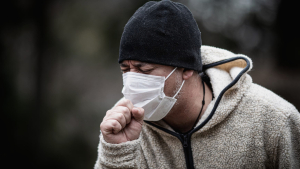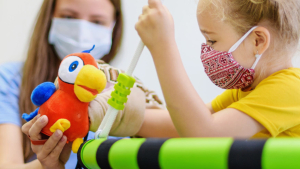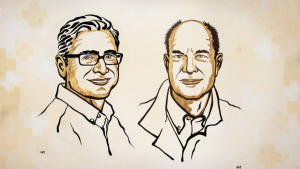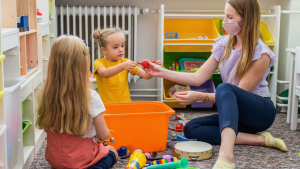People are having less sex these days than they did a few years ago. With yourself or with others. And regardless of age. This is also indicated by a study from the USA, which was published in the magazine "Archives of Sexual Behavior" on November 19, 2021. According to this, between 2009 and 2018, the proportion of young people who reported that they were not sexually active either alone or with partners increased from 28.8 percent to 44.2 percent for young men and from 49.5 percent to 74 percent for young women.
The study authors have not examined why this is so. But their many years of experience as sex educators allow two of them to discuss in an interview in more detail what factors could explain these changes. Debby Herbenick, first author of the study, and Tsung-Chieh (Jane) Fu, co-author, talk, among other things, to what extent as to what extent asexual identity and "rough sex" affect how often people have sex. They also explain how caregivers can help children in their healthy sexual development and how corona apandemia has influenced sexual behavior.
»Scientific American«: It is already known from studies from other parts of the world that people in partnerships have less sex. What do your recent results contribute to this new insight?
Debby Herbenick: You expand research because Jane [Fu] and the team have differentiated sexual behavior. We examined penis vaginal sex, masturbation in the partnership as well as oral sex and oral sex-everything takes place less often. We also included young people. It is striking that less of them satisfy themselves. A lot more attention should be paid to this topic.
How can the decline in young people be explained?
Tsung-Chieh (Jane) FU: We need more studies to find out the reasons. But for young people, for example, computer games replace the increasing use of social media and video games this time.
Herbenick: We assume that there is more than one explanation or one reason. Depending on the age group, partnership status and gender, it is likely to differ. You don't need the individual factors to explain the majority, but each of these factors could provide one or two percentage points.
To what extent is it possibly relevant that more and more people live out their asexuality?
Herbenick: Why more people describe themselves as asexual is not known. But I think more people should be aware that it's a valid identity. When I started teaching sexuality in 2003, I regularly had a student in my class who could identify as asexual. Now I have three or four. That's impressive. It's great that young people know so many ways to put their feelings into words. For many of them, it's okay if they decide against sex.
In your article you mention that the increase in "Rough Sex" may contribute to the trend. Can you explain what you mean?
Herbenick: Especially among 18- to 29-year-olds, what many people call "rough sexual behavior" has increased. Limited research suggests that this used to be what I would call rather mundane rough sex: pulling your hair, a bit of a beating.
What we now see in studies with thousands of randomly selected college students is choking or choking, during sex. This behavior seems to be in the majority of students in college age. For many people it is mutually agreed and desired, but also scary for many, even if they learn to enjoy or want it. This is an important research focus of our team: to understand how you feel, what health risks exist and how that fits the general sexual landscape.
Fu: We've noticed that these behaviors have changed. We don't know to what extent this makes some people decide; but we know that some people are afraid and do not know what to make of what is presented to them; especially young adults. We see numerous gender implications across a variety of behaviors for diverse non-heterosexual identities. Bisexual women, for example, are much more likely to be affected by these aggressive behaviors.
Herbenick: We tried to disguise this because our research does not clearly show how often the practices are desirable and pleasant or undesirable, because bisexual women also report sexual victimization more often.
There are probably several reasons why people's sexual expression has changed, you write...
Herbenick: Various explanations have been proposed in studies from all over the world, for example the economic status. A lower income is associated with a greater decline. One study examined the use of computer games among young people as a possible explanation. Some people have followed the decrease in alcohol consumption, and we know that alcohol consumption can be associated with disinhibition. We have noticed a certain increase in the use of sex toys – not a massive increase from what we have studied. I don't expect it to be the explanation for that.
What do you want to advise people who read their interview and ask themselves: "What should I do with this information?" - perhaps from your own perspective, that of your partner or partner or in conversations with the children?
Fu: It would be great for parents to have open conversations about sex with their children. Especially with teenagers. Sex in recent years looks very different than it used to, whether due to the advent of new technologies or new sexual behaviors. We hope that parents can guide their children, not only to warn them about the risks of various sexual behaviors, but also to teach them how to have meaningful relationships and eventually satisfying and pleasurable sex.
Herbenick: For many of us, it is worth asking a few questions: How do I feel with my sex life? How does my partner feel? Ask him! Some people look around and have the feeling that the sexual interactions they have are pleasant, connecting and joyful and represent a satisfactory sex life for them. Others may look around and say: »You know 10 to 15 years ago, when we couldn't see so many funny programs on TV, we saw much less away and had sex more often. I wonder how we could have sex more often? "
How does sexual activity with or without a partner intersect with other aspects of health? And what does "sexual health" look like?
Herbenick: Sexuality is an important part of life. Understanding what changes is important to understand what changes in human experience. We know that sexual activity can help people relax, fall asleep, to reduce stress, to feel intimate and connected and thereby improve their relationships. It can even help strengthen your immune system.
But sex can also be just fun and enjoyable – a way to express yourself in a vulnerable way. Sexual health is a multidimensional phenomenon that is not only about the presence or absence of infections or diseases, but also about the potential for pleasure, access to correct information about sexuality, physical autonomy and the possibility of having sexual experiences free from violence or coercion.
What impact on these behaviors do you already see or expect from the pandemic that has not yet been captured in your study?
Fu: Things change strongly when people are at home. The possibility of working from home has meant that some partners who have a long -distance relationship can spend more time together or even live together. But for partners who do not live together and do not have the opportunity to work from home, difficulties while traveling can lead to even less time together.
For those who live with their partner, more time spent together at home does not necessarily lead to more and more satisfying or pleasurable sex. Quarantine, social distancing, financial difficulties, working from home – all of these can lead to tensions in the relationship. The loss or instability of childcare due to the pandemic can limit the sex lives of those who are parents.
Herbenick: Certainly people who have not lived with a partner have experienced more restrictions on sex in partnership in the past two years than others. Although this should have been a bit relaxed since the vaccinations and refresher vaccinations. But our sex life does not take place in a vacuum, so there are countless factors.
The past two years have also brought a lot of grief for people who have lost family members through Covid. Numerous people have to deal with a lengthy covid disease and the associated health problems, loss of job and financial burdens. And more people of all ages have struggled with anxiety and depression since pandemic. All of this also has an impact on sexual interest and sex drive.
It is an edited transcript of the interview, which has been adapted for the German version for better readability.



















